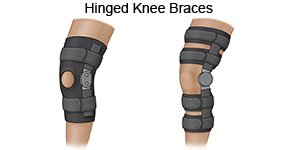Knee Dislocation
Medically reviewed by Drugs.com. Last updated on May 6, 2024.
What is a knee dislocation?
A knee dislocation happens when an injury forces your thigh bone out of alignment with your shin bone. It may occur with other injuries. It can also cause torn ligaments in your knee or nerve damage.
 |
What are the signs and symptoms of a knee dislocation?
- Pain and swelling in your leg and knee
- Numbness or weakness in your lower leg
- A lower leg that looks pale or feels cold
- Not being able to move or stand on your leg
- A change in the shape of your knee
How is a knee dislocation diagnosed?
Your healthcare provider will examine your knee and any other wounds. Tell him or her how your injury happened. He or she may ask you to move your leg and foot, or flex your toes. Tell the provider if you have other health conditions. Tell him or her if you take medicines, such as blood thinners. You may need any of the following tests:
- X-ray, MRI, CT, or ultrasound pictures may be taken of your knee. They are used to see if your knee is dislocated and if you have other injuries. You may be given contrast liquid to help your knee show up better in the pictures. Tell the healthcare provider if you have ever had an allergic reaction to contrast liquid. Do not enter the MRI room with anything metal. Metal can cause serious injury. Tell the healthcare provider if you have any metal in or on your body.
- An arteriogram is a type of x-ray. Contrast liquid is injected into your blood vessels. The pictures will show if blood is flowing normally through your leg. Tell the healthcare provider if you have ever had an allergic reaction to contrast liquid.
How is a knee dislocation treated?
The goal of treatment is to repair your knee dislocation and other injuries. The type of treatment depends on your injuries, your age, and your activity level. You may need the following:
- Prescription pain medicine may be given. Ask your healthcare provider how to take this medicine safely. Some prescription pain medicines contain acetaminophen. Do not take other medicines that contain acetaminophen without talking to your healthcare provider. Too much acetaminophen may cause liver damage. Prescription pain medicine may cause constipation. Ask your healthcare provider how to prevent or treat constipation.
- Acetaminophen decreases pain and fever. It is available without a doctor's order. Ask how much to take and how often to take it. Follow directions. Read the labels of all other medicines you are using to see if they also contain acetaminophen, or ask your doctor or pharmacist. Acetaminophen can cause liver damage if not taken correctly.
- NSAIDs , such as ibuprofen, help decrease swelling, pain, and fever. This medicine is available with or without a doctor's order. NSAIDs can cause stomach bleeding or kidney problems in certain people. If you take blood thinner medicine, always ask if NSAIDs are safe for you. Always read the medicine label and follow directions. Do not give these medicines to children younger than 6 months without direction from a healthcare provider.
- A procedure may be used to move your leg bones back into place. This is done by moving your knee and leg in different positions until your bones line up properly. The procedure is sometimes done during surgery.
- Fasciotomy is a procedure to make a long incision in your leg. This is done to relieve the pressure caused by swelling or bleeding.
- Surgery may be done to repair damaged nerves, ligaments, and blood vessels. It may also be done to move your leg bones back into place. Your healthcare provider may perform surgery right away after your knee dislocation. He or she may decide to wait until other injuries are treated.
What can I do to manage a knee dislocation?
It may take weeks or months for your knee to heal. You will have to wait until you heal to return to your usual activity level. The following can help you manage your symptoms and prevent more injury while you heal:
- Apply ice. Ice helps decrease swelling and pain, and may help prevent tissue damage. Use an ice pack, or put crushed ice in a plastic bag. Cover it with a towel and place it on your knee for 15 to 20 minutes every hour or as directed.
- Elevate your knee above the level of your heart as often as you can. This will help decrease swelling and pain. Prop your knee on pillows or blankets to keep it elevated comfortably.

- Prevent your knee from moving for up to 6 weeks or as directed. Your healthcare provider may put on a cast or splint. You may need to wear a leg brace to stabilize your knee. A leg brace can be adjusted to increase your range of motion as your knee heals.

- Use crutches if directed. Your healthcare provider may tell you not to put weight on your injured knee. Your healthcare provider will show you how to use crutches. You may need them for 4 to 6 weeks.
- Go to physical therapy if directed. A physical therapist can teach you exercises to increase the range of motion in your knee. Exercises make your knee stronger, increase balance, and decrease pain. You may also need to strengthen your stomach, back, hip, and leg muscles. You may be told to continue these exercises after physical therapy ends to help prevent another dislocation.
Call your local emergency number (911 in the US) if:
- You feel lightheaded, short of breath, and have chest pain.
- You cough up blood.
When should I seek immediate care?
- You have severe pain and swelling in your lower leg.
- Your lower leg looks pale.
- Your leg feels warm, tender, and painful. It may look swollen and red.
When should I call my doctor?
- You have leg pain that does not go away after you take pain medicine.
- You have questions or concerns about your condition or care.
Care Agreement
You have the right to help plan your care. Learn about your health condition and how it may be treated. Discuss treatment options with your healthcare providers to decide what care you want to receive. You always have the right to refuse treatment. The above information is an educational aid only. It is not intended as medical advice for individual conditions or treatments. Talk to your doctor, nurse or pharmacist before following any medical regimen to see if it is safe and effective for you.© Copyright Merative 2024 Information is for End User's use only and may not be sold, redistributed or otherwise used for commercial purposes.
Further information
Always consult your healthcare provider to ensure the information displayed on this page applies to your personal circumstances.
